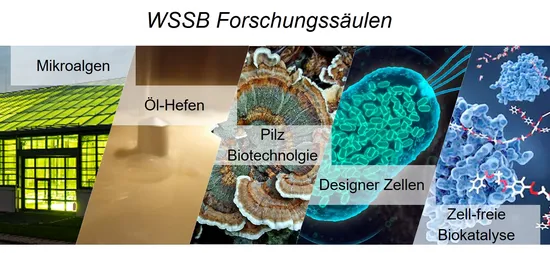Werner Siemens-Chair of Synthetic Biotechnology (WSSB)
Global climate change and dwindling geochemical resources force changes in the chemical production processes for commodity and fine chemicals as well fuel sources. Sustainable chemical, pharmaceutical and energy production processes are increasingly based on biochemical transformations of renewable biomass with no CO2 emissions, operating at high energy and molecular efficiencies.
The research of the Werner Siemens-Chair of Synthetic Biotechnology is focused on fundamental aspects of biocatalysis and genetic engineering to understand and predict the basic molecular and structural features that provide or impose industrial process fitness on biocatalytic systems. Research involves novel biotechnological processes that utilize agricultural (i.e. Straw), forestry (i.e. wood residue) and food (i.e crab shells) waste biomass as feedstocks for focused biotransformations that yield industrially relevant chemical building blocks and renewable fuels. Waste Biomass streams do not compete with food production, are not associated with land use change or increased water utilization. Commonly waste biomass is composed of a complex chemical matrix encompassing, i.e. polymeric sugars (i.e. cellulose), proteins and polyphenolics (i.e. lignin).
Utilization of these polymeric components in biotechnological processes requires their primary conversion (depolymerization) into monomeric building blocks. Downstream biotechnological processes will subsequently carry out transformation of monomeric constituents to yield value adding products. Basis for the transformation of biomass into industrially relevant products are biocatalytic processes.
This may encompass both specific in-vitro enzymatic process steps as well as complex whole cell biotransformations that allow consolidated genetic construction of natural or synthetic enzymatic reactions cascades for multi-step conversion of a substrate into a desired end-product. In contrast to their inorganic counterparts, biocatalysts operate under mild (environmentally friendly) reaction conditions and demonstrate remarkable substrate and product selectivities.
